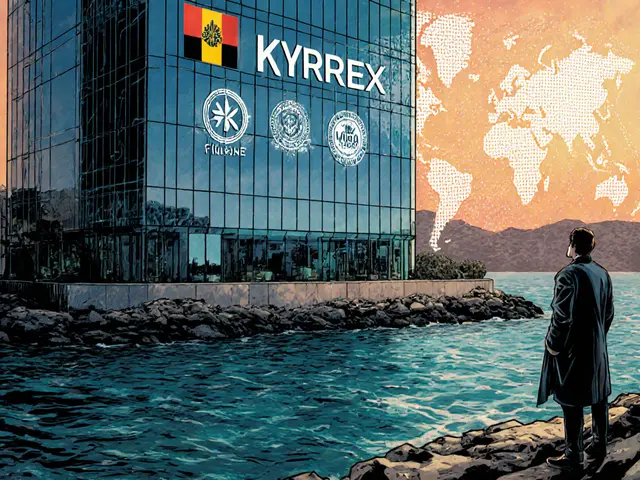Switzerland’s Crypto Valley Regulations in Zug: A 2025 Guide
Switzerland's Crypto Valley Timeline
Key Regulatory Milestones in Zug
Explore the timeline of significant regulatory developments shaping Switzerland's crypto landscape:
2016 - Early Adoption
Zug becomes the first municipality to accept Bitcoin and Ether for council tax payments up to CHF 100,000.
Municipal Innovation2021 - Legal Foundation
The DLT Act (Distributed Ledger Technology Act) becomes effective, creating legal definitions for tokenized assets and trading venues.
DLT Act2025 - Market Regulation
BX Digital receives Switzerland's first DLT trading venue license from FINMA, enabling regulated tokenized securities trading.
BX Digital License2025 - Tax Clarity
Swiss Federal Tax Administration provides clear guidance on crypto taxation, with no capital-gains tax for individuals.
Tax FrameworkJune 2025 - International Compliance
The Automatic Exchange of Crypto-Asset Information (AEOI) is approved, requiring data sharing with 74 partner countries starting 2027.
AEOI Approval2025 - Banking Integration
PostFinance begins offering cryptocurrency custody and savings plans, becoming the first systemically important bank to do so.
Banking IntegrationRegulatory Pillars Explained
FINMA Oversight
Swiss Financial Market Supervisory Authority oversees crypto-related licensing, AML enforcement, and market supervision.
DLT Act
Creates legal definition for distributed-ledger-technology tokens and trading venues effective August 1, 2021.
AEOI
Automatic Exchange of Crypto-Asset Information approved June 6, 2025, to be implemented from 2027.
Key Takeaway
Switzerland's regulatory approach has transformed Zug into a global crypto hub, balancing innovation with investor protection through clear legal frameworks and proactive oversight.
When you hear the name Crypto Valley refers to the cluster of blockchain and cryptocurrency firms that have set up shop in the Swiss canton of Zug, the first thing that comes to mind is a regulatory playground where innovators can test ideas without fearing sudden bans. But the reality is far more nuanced: a carefully crafted legal framework, a proactive tax authority, and a federal watchdog that balances risk with growth. In 2025, Zug remains the poster child for how a small region can become a global crypto hub while staying on the right side of the law.
Why Zug Became the World’s First Crypto Valley
Back in 2016, the municipal government made headlines by accepting Bitcoin and Ether for council tax up to CHF100,000. That bold move was more than a publicity stunt; it signaled a willingness to embed digital assets into everyday services. The decision dovetailed with Switzerland’s federal principle of “same risks, same rules,” meaning that crypto‑related activities are subject to the same standards as traditional finance, just applied to a new asset class. This alignment attracted early adopters, venture capital, and a wave of talent that still fuels the ecosystem today.
The Core Legal Pillars
The regulatory backbone rests on three interlocking components:
- FINMA the Swiss Financial Market Supervisory Authority oversees all crypto‑related licensing, AML enforcement, and market supervision.
- The DLT Act effective August12021, creates a legal definition for distributed‑ledger‑technology tokens and trading venues.
- The upcoming AEOI Automatic Exchange of Crypto‑Asset Information, approved June62025, will force Swiss entities to share holder data with 74 partner countries starting in 2027.
These pillars work together to keep the market fluid while protecting investors.
Licensing in Action: BX Digital’s Milestone
On March252025, BX Digital received Switzerland’s first DLT trading venue license from FINMA. The approval allowed multilateral trading of tokenized securities on a regulated platform, marking a shift from sandbox experiments to full‑scale market infrastructure. BX Digital’s model shows how the DLT Act translates into real‑world liquidity, drawing both crypto‑native firms and traditional banks into the same order book.
Taxation: The Sweet Spot for Investors and Companies
Switzerland’s tax treatment is a major draw:
- Individual crypto investors face no capital‑gains tax on disposals, mirroring the treatment of gold or real estate.
- Mining, staking, or any activity that generates regular income is taxed as ordinary income.
- All crypto holdings are subject to an annual wealth tax, reported on the same forms used for traditional assets.
The Swiss Federal Tax Administration provides clear guidance on crypto taxation, eliminating the gray areas that plague many jurisdictions. As of April2025, there is no dedicated digital‑service tax, meaning startups can focus on product development rather than compliance overhead.

Stablecoins and the Substance‑Over‑Form Approach
FINMA treats stablecoins the same way it handles traditional financial instruments. If a token functions like a payment instrument, the Swiss Banking Act may kick in; if it resembles a collective investment scheme, the Collective Investment Schemes Act applies. This “substance‑over‑form” stance ensures that stablecoin projects are not automatically banned, but they must meet the same prudential standards as banks or fund managers.
Market Impact: Growth Numbers That Speak
According to industry data, the combined valuation of the top50 blockchain companies in Switzerland and Liechtenstein hit USD584.33billion in 2023-a 56% jump from the previous year. Zug remains the epicenter, while Zurich and Liechtenstein have become secondary hubs for venture funding. The regulatory environment clearly correlates with this surge; where rules are clear, capital flows.
Banking Integration: From PostFinance to BX Swiss
Traditional banks are no longer on the sidelines. PostFinance became the first systemically important Swiss bank to offer cryptocurrency custody and savings plans, providing 11 different tokens to retail clients. Meanwhile, BX Swiss partnered with Credit Suisse, Pictet, and Vontobel to pilot blockchain‑based settlement of tokenized securities. These pilots connected Ethereum testnets to the Swiss Interbank Clearing system, proving that regulated fiat settlement can coexist with decentralized token trading.
Compliance Checklist for Crypto Companies in Zug
| Requirement | Regulatory Basis | Typical Deadline |
|---|---|---|
| FINMA licensing (DLT venue, crypto‑asset dealer) | DLT Act & FINMA Ordinances | Up to 6months from application |
| AML/KYC procedures | Swiss Anti‑Money Laundering Act | Continuous |
| Wealth‑tax reporting | Swiss Federal Tax Administration | Annual filing (March31) |
| Stablecoin licensing assessment | Banking Act or CIS Act (substance‑over‑form) | Case‑by‑case |
| AEOI data preparation (post‑2026) | Automatic Exchange of Crypto‑Asset Information | First exchange due 2027 |
Future Outlook: What’s Next After 2025?
Two developments will shape the next wave of activity:
- AEOI rollout - By 2027, Swiss crypto firms will automatically share holder data with partner tax authorities, raising compliance standards without dampening innovation.
- More DLT venue licences - FINMA’s first licensing decision set a precedent; expect a pipeline of applications from both home‑grown startups and foreign exchanges seeking a trustworthy European foothold.
For entrepreneurs, the message is clear: Switzerland offers a stable, transparent, and forward‑looking framework. The key is to align with FINMA’s risk‑based approach, maintain robust AML controls, and stay ahead of the AEOI reporting timeline.

Frequently Asked Questions
Can I pay my municipal taxes in Zug with Bitcoin today?
Yes. Zug accepts Bitcoin and Ether for council tax up to CHF100,000 per year. Payments are processed through a partnership with a local crypto‑payment gateway.
Do crypto traders need a FINMA licence to operate in Zug?
Only if they run a regulated service such as a DLT trading venue, a crypto‑asset dealer, or a custodial wallet that holds client funds. Pure peer‑to‑peer trading without custody does not require a licence, but AML obligations still apply.
How are crypto gains taxed for individuals?
Private individuals do not pay capital‑gains tax on the sale of cryptocurrencies. However, income from mining, staking, or employment‑related crypto compensation is taxed as ordinary income.
What happens to stablecoins under Swiss law?
FINMA looks at the token’s economic function. If it operates like a payment instrument, the Banking Act applies; if it resembles a collective investment scheme, the CIS Act applies. No separate stablecoin law exists.
When will the AEOI data exchange start?
The automatic exchange of crypto‑asset information is scheduled to begin in 2027, following the 2026 implementation of the legal framework.






19 Comments
Sophie Sturdevant
February 21 2025Alright, let’s dissect why Zug’s regulatory scaffolding is the gold standard for crypto ecosystems. First, the DLT Act established a crystal‑clear legal definition for tokenized assets, which eliminates the ambiguity that plagues most jurisdictions. Second, FINMA’s risk‑based licensing approach forces firms to embed AML controls from day one, preventing the “wild west” scenario. Third, the tax authority’s decision to exempt private capital gains aligns crypto with traditional wealth preservation strategies, attracting high‑net‑worth individuals. Fourth, the municipality’s willingness to accept Bitcoin for tax payments signals political commitment beyond rhetoric. Fifth, the AEOI framework, despite its future rollout, demonstrates proactive alignment with global transparency standards. Sixth, the licensing of BX Digital proved that a sandbox can graduate to a full‑scale trading venue without regulatory backlash. Seventh, PostFinance’s custodial services bridge the gap between fiat‑centric banks and decentralized assets, forging a hybrid model. Eighth, the substance‑over‑form doctrine for stablecoins means projects can innovate as long as they meet existing banking or investment fund rules. Ninth, the wealth‑tax reporting requirement keeps the ledger open for auditors, fostering trust among institutional investors. Tenth, the collaborative ecosystem of legal firms, auditors, and tech providers in Zug creates a one‑stop‑shop for compliance. Eleventh, the transparent public‑private partnership model reduces the “regulatory uncertainty premium” that investors typically price in. Twelfth, the consistent enforcement timeline-laws passed in 2021, licenses in 2025-gives startups a predictable roadmap. Thirteenth, the finite number of partner countries for the AEOI ensures data sharing remains manageable while still comprehensive. Fourteenth, the fact that the Swiss Federal Tax Administration publishes detailed guidance removes guesswork for crypto‑related income streams. Finally, the overall philosophy of “same risks, same rules” embeds crypto seamlessly into the broader financial system, making Zug a replicable template for other jurisdictions.
Jan B.
March 2 2025FINMA’s oversight is a cornerstone; it balances innovation with investor protection. The DLT Act provides the legal backbone. AML requirements are non‑negotiable. Swiss wealth tax still applies to crypto holdings. Overall, the framework is robust.
MARLIN RIVERA
March 11 2025That rosy picture ignores the fact that many firms still drown in compliance costs. The licensing process is a labyrinth that favors incumbents, not startups. Regulators love to talk about “balance,” but the scales are heavily weighted toward big banks.
emmanuel omari
March 20 2025Zug’s success proves that a small canton can outshine larger economies when it adopts clear-cut rules. Other countries should stop whining about “sovereignty” and copy the Swiss model. The data shows a 56% jump in valuation because of certainty, plain and simple.
Andy Cox
March 29 2025yeah the numbers look good but it’s also about talent flowing in because of lifestyle not just rules. the vibe there attracts people who want freedom and that boosts the ecosystem
Sidharth Praveen
April 7 2025Seeing the timeline from 2016 to 2025 is inspiring; it shows how policy can evolve with technology. Early municipal adoption set the tone, and the subsequent legal pillars built a solid foundation. For anyone looking to launch a crypto startup, Zug offers a playbook: start with community engagement, then align with FINFINMA guidance, and finally leverage the tax advantages. The future looks bright, especially as more DLT venue licences roll out.
Richard Herman
April 15 2025The collaborative spirit between traditional banks and crypto firms in Zug is a model of constructive dialogue. PostFinance’s custody service and BX Swiss’s settlement pilots show that integration is possible without sacrificing security. This balanced approach can ease the fears of skeptics while still fostering innovation.
Parker Dixon
April 24 2025Exactly! 🎉 The synergy between legacy finance and decentralized tech creates a win‑win scenario. 🚀 It’s like watching two worlds finally shake hands and dance together. The community vibe in Zug really shines through these partnerships.
Stefano Benny
May 3 2025While everyone applauds the “regulatory playground,” the underlying compliance stack is a tangled web of AML, KYC, and cross‑border reporting that can choke nascent projects. The AEOI rollout in 2027 will add another layer of data‑exchange overhead that many startups aren’t ready for. 🤔
Bobby Ferew
May 12 2025Honestly, the hype feels like a sugar‑coated veil over relentless bureaucracy.
celester Johnson
May 21 2025One could argue that the allure of Swiss neutrality extends into its crypto policies, creating a paradox where freedom is framed by strict oversight. This tension mirrors the age‑old debate between liberty and order, now transposed onto digital assets.
Prince Chaudhary
May 30 2025Let’s keep the conversation focused on practical steps: ensure your AML policies are up to date, prepare for the upcoming AEOI data format, and consider partnering with a local compliance firm. These actions will position you well for the 2027 deadline.
John Kinh
June 7 2025Sure, but that’s just generic advice anyone can find on a wiki page. 🙄 Real insight would be sharing how to actually cut through the red tape without hiring a team of lawyers.
Mark Camden
June 16 2025It is imperative to acknowledge that regulatory compliance is not merely a bureaucratic hurdle but a moral obligation to protect investors and maintain market integrity. The Swiss framework exemplifies this ethical commitment.
Evie View
June 25 2025All this “ethical commitment” sounds like a smokescreen to keep the elite in control while pretending to be inclusive.
Nathan Blades
July 4 2025The narrative of Crypto Valley reads like an epic saga-heroes daring to challenge the old guard, mentors in the form of FINMA guiding them, and a kingdom (Zug) that rewards bravery with clear laws. Every startup that steps onto this stage gets a chance to write its own legend, provided it respects the script of compliance.
Somesh Nikam
July 13 2025Indeed! 😊 Keep the spirit alive, stay diligent with your AML checks, and you’ll not only survive but thrive in this vibrant ecosystem. 💪
Debby Haime
July 22 2025Bottom line: if you want to ride the crypto wave, Zug gives you both the surfboard and the safety net. Get your paperwork in order, tap into local expertise, and enjoy the ride.
Courtney Winq-Microblading
July 30 2025One might say the blockchain itself is a metaphor for existential freedom, and Zug’s regulations are the gentle gravity that shapes that freedom into something tangible.